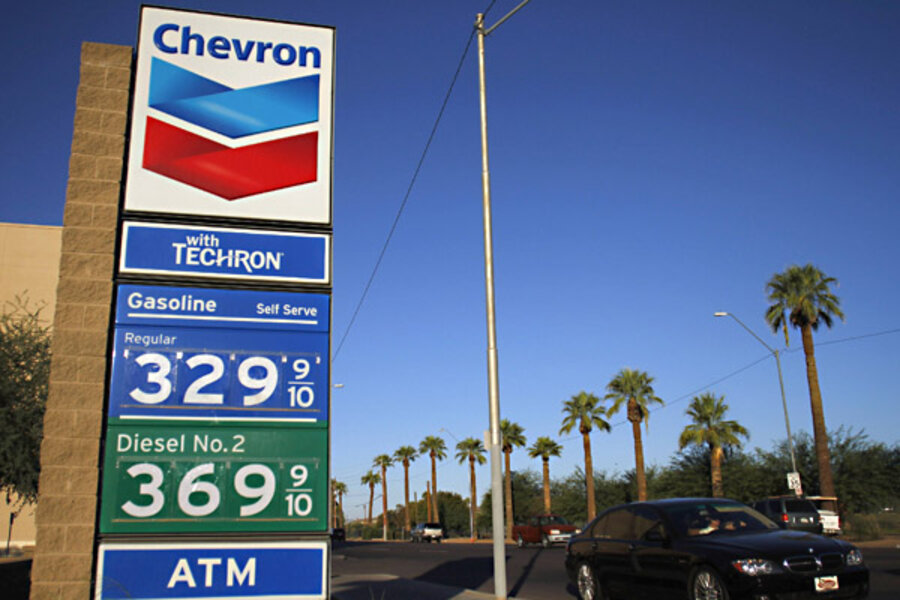High gas prices? Don't (always) blame oil speculators.
Loading...
Let’s Play ‘Blame the Speculators’
Most people would probably agree that speculation in the oil and gas markets is hurting American consumers. Consider the case of Aubrey McClendon. Mr. McClendon is the CEO of Chesapeake Energy, where he sells natural gas for a living. Natural gas prices have now been pushed down — by speculators — to below $2 per million BTU. This is a drop of more than 80% from 2008 prices. With these depressed prices, Mr. McClendon will have a hard time ever matching his $112 million of earnings in 2008. Mr. McClendon’s livelihood has been hurt by speculators.
Of course Aubrey McClendon is not your average person, and he isn’t likely to garner much sympathy over the decline in natural gas prices — especially since it has benefited consumers. But I use that example to illustrate the point that speculation is not a one-way street where the average consumer always loses. One of the frequently cited causes of high oil prices is from speculation. In fact, I agree that speculation is helping drive up oil prices. However, there are underlying fundamentals at work as well; otherwise the same speculators who are helping drive up oil prices would be doing the same with natural gas prices. Yet those underlying fundamentals are often overlooked in the rush to blame the speculators for spiking oil prices.
Speculators Play the Game Both Ways
Speculation can drive prices in either direction. If there is a widely held belief that oil prices will be higher, the price of oil will be bid up. It’s the same reason that the share price of Apple rises: Investors speculate that the company will do well in the future and they drive up the price in anticipation of future value. In the case of oil, the most recent speculation is that trouble in Iran could remove a significant quantity of oil from the market, driving prices much higher.
But one has to look no further than natural gas pricing to see that this goes both ways. With natural gas below $2 per MMBTU, producers will struggle to make a profit. They are already cutting back on drilling. The sentiment is that there is a very big supply of natural gas, and so the speculators in that case have driven prices down very low — in this case saving consumers a lot of money. In the case of oil, the fear is that supplies won’t be sufficient to meet current demand.
Incidentally, politicians and consumers frequently ask “Why are oil companies ripping us off by selling oil for $100 a barrel?” But ExxonMobil also happens to be the largest natural gas producer in the U.S. Rephrase the question to ask “Why are oil companies giving us a break by selling natural gas at under $2 when they were selling it for over $10 five years ago?” — and you can start to see that they really don’t have much control over pricing. That is set by how much speculators and actual end users are willing to pay on exchanges like the New York Mercantile Exchange (NYMEX).
Conclusion: There Are Limits to How Much Speculation Can Affect Prices
I am not suggesting that we shouldn’t limit speculation. I really don’t know the answer to that one. If you banned investment banks from participating in the oil markets, my assumption would be that it would cause somewhat lower prices when prices are high and somewhat higher prices when prices are low. It would probably knock off the extreme swings on either end. But my main point here is that speculation by itself is not to blame for high oil prices, and eliminating speculation is not going to fix the problem of high oil prices.
This column was prompted by Eric Bolling’s assertions on Fox News that he has the answer to high gas prices. For weeks he has been hyping his “secret plan” which he “guarantees” will reduce gasoline prices by $1 a gallon. (Steven Colbert recently skewered Bolling’s antics over his secret plan). It turns out that “limit the speculation” was his answer for reducing gasoline prices by $1 a gallon.
That answer itself certainly isn’t new and novel; many people have been pushing this long before Bolling brought it up. But it ignores the two important facts I have highlighted here: Speculation drives prices higher AND lower, and there are often fundamental issues of supply and demand that drive that speculation. And if you want to know the single biggest driver of high gasoline prices today, just look at the consumption growth in developing countries. Eliminating speculation isn’t going to address that issue. Eliminate speculation and today’s gasoline prices would still be high, just perhaps not quite as high. And natural gas prices would perhaps not be as low.
The Christian Science Monitor has assembled a diverse group of the best economy-related bloggers out there. Our guest bloggers are not employed or directed by the Monitor and the views expressed are the bloggers' own, as is responsibility for the content of their blogs. To contact us about a blogger, click here. This post originally ran on www.consumerenergyreport.com.





